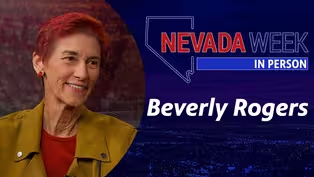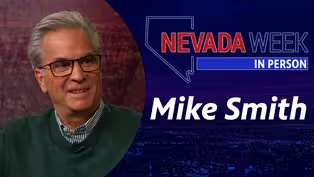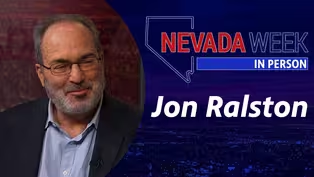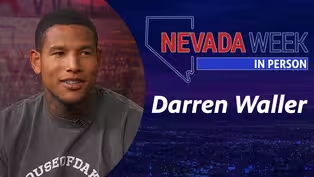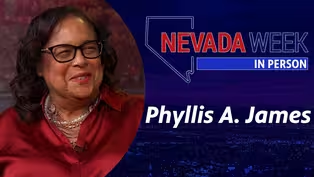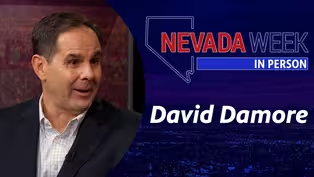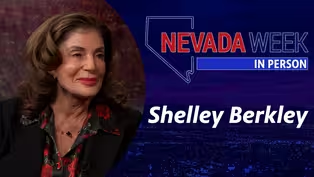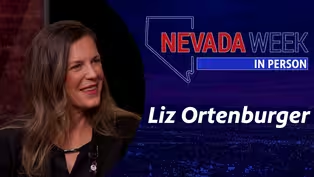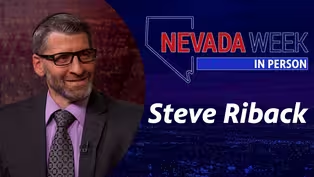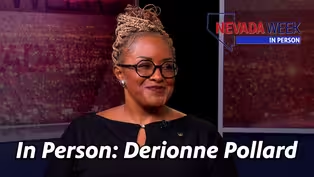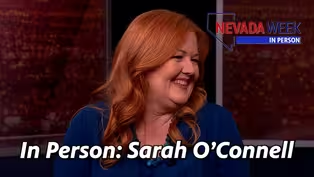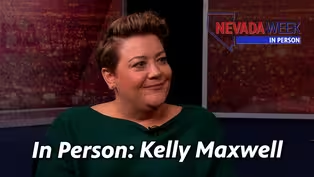
Nevada Week In Person | Hilarie Grey
Season 1 Episode 23 | 13m 59sVideo has Closed Captions
One-on-one with the Animal Foundation CEO Hilarie Grey.
One-on-one with the Animal Foundation CEO Hilarie Grey.
Problems playing video? | Closed Captioning Feedback
Problems playing video? | Closed Captioning Feedback
Nevada Week In Person is a local public television program presented by Vegas PBS

Nevada Week In Person | Hilarie Grey
Season 1 Episode 23 | 13m 59sVideo has Closed Captions
One-on-one with the Animal Foundation CEO Hilarie Grey.
Problems playing video? | Closed Captioning Feedback
How to Watch Nevada Week In Person
Nevada Week In Person is available to stream on pbs.org and the free PBS App, available on iPhone, Apple TV, Android TV, Android smartphones, Amazon Fire TV, Amazon Fire Tablet, Roku, Samsung Smart TV, and Vizio.
Providing Support for PBS.org
Learn Moreabout PBS online sponsorshipMore from This Collection
Nevada Week In Person goes beyond the roundtable discussion of Nevada Week with guests for a more casual conversation about their personal passions, new projects and compelling stories that are overlooked in the flurry of the news cycle.
Nevada Week In Person | Beverly Rogers
Video has Closed Captions
One-on-one interview with Rogers Foundation chair Beverly Rogers. (14m)
Nevada Week In Person | Mike Smith
Video has Closed Captions
One-on-one interview with Las Vegas Sun political cartoonist Mike Smith. (14m)
Nevada Week In Person | Jon Ralston
Video has Closed Captions
One-on-one interview with The Nevada Independent CEO Jon Ralston. (14m)
Nevada Week In Person | Darren Waller
Video has Closed Captions
One-on-one interview with Las Vegas Raider tight end Darren Waller. (14m)
Nevada Week In Person | Phyllis A. James
Video has Closed Captions
One-on-one interview Phyllis A. James. (14m)
Nevada Week In Person | David Damore
Video has Closed Captions
One-on-one interview with Chair of the Department of Political Science at UNLV David Damor (14m)
Nevada Week In Person | Shelley Berkley
Video has Closed Captions
One-on-one interview Senior Vice President for Touro University Shelley Berkley. (14m)
Nevada Week In Person | Liz Ortenburger
Video has Closed Captions
One-on-one interview with SafeNest CEO Liz Ortenburger. (14m)
Nevada Week In Person | Steve Riback
Video has Closed Captions
One-on-one interview with Las Vegas Metro Police Lieutenant Steve Riback. (14m)
Nevada Week In Person | DeRionne Pollard
Video has Closed Captions
One-on-one interview Nevada State College President DeRionne Pollard. (14m)
Nevada Week In Person | Sarah O’Connell
Video has Closed Captions
One-on-one interview with Director of Eat More Art LLC Sarah O’Connell. (14m)
Nevada Week In Person | Kelly Maxwell
Video has Closed Captions
One-on-one interview with Baby’s Bounty Executive Director Kelly Maxwell. (14m)
Providing Support for PBS.org
Learn Moreabout PBS online sponsorshipShe oversees Nevada's largest animal shelter and took on the role amid controversy.
After her predecessor stepped down following complaints against shelter conditions, Hilarie Grey became the new CEO of the Animal Foundation and joins us this week on Nevada Week In Person.
♪♪♪ Support for Nevada Week In Person is provided by Senator William H. Hernstadt and additional supporting sponsors.
(Amber Renee Dixon) Prior to leading the Animal Foundation, one of the highest volume, single-site animal shelters in the country, Hilarie Grey worked more than 20 years in public affairs, marketing and government here in Southern Nevada.
Hilarie Grey, thank you for joining us for Nevada Week In Person.
First off how did you become aware of this job, and what led you to want to take it?
(Hilarie Grey) Well, I've been an animal person my entire life and an advocate, and of course as someone who's lived in Southern Nevada a long time, I followed the Animal Foundation pretty regularly and they made an incredible transformation over the course of 15 years.
I don't think anybody should minimize that.
I knew the longtime CEO was retiring but didn't really think about it, and I got recommended.
I got a recruitment when they were going through the search process.
And in addition to my regular job that I was doing at the time, I had actually been on the board of Nevada SPCA that went through a lot of changes where they had dangerous conditions in their shelter, their executive director stepped down, so they recruited a new board to kind of take them through that whole reclamation process.
So I learned a lot, and when this opportunity came around, it's like you know, maybe things are aligning.
I think there's good experience there that I can bring to the table too.
-So you already had experience in revamping or fixing some of the issues within an animal shelter.
That's experience not many people can say they have.
-Yes.
We actually moved into a new space, so I learned all about facility planning and airflow and drainage and all of the things that you need to know to keep animals safe and keep those processes going well.
-So then you must have felt pretty confident going into this position.
-I mean, it's a large operation.
It's a really special place that means a lot to the community, so I was excited about it but, you know, very much going in eyes wide open, as I know that there had been some issues in the community.
And like all of the businesses and nonprofits, there have been some changes through the pandemic as well that affected personnel and things like that, and those were the discussions that I had with the board during the recruitment too.
But to be able to come in especially after-- and I don't know if you're aware of this-- but in December there was an assessment done of the Animal Foundation by Maddie's Pet Project which is a very well reputed shelter education and funding agency, and they already came in with some recommendations for things we could do to really get up to best practices, very rigorous, so very excited to come in and be able to institute that playbook.
-You said "eyes wide open" you went into this.
What did you notice immediately?
-Well, the first thing that's a fantastic thing is the heart of all the team members there.
Everybody is there too a person because they love animals, and they believe in the mission.
They all want to make Las Vegas a more humane community, which I believe is so important to a lot of social issues.
Pet issues are social issues, so that was a lot of the appeal to me.
So you have a really good foundation there of people that want to be there that just need some help to clear obstacles to work together better, put in place some tighter practices and things like that, customer service principles, just ways that we can work better and serve everybody in the Las Vegas valley better, focus our resources on the animals that need us the most and be able to help people on both sides.
Somebody said both sides of the leash.
I thought this was nice.
So people coming in that maybe think they have no other choice because of their circumstances than to surrender a pet, how can we help them?
How can we help keep pets in homes?
Then on the other side when you have an adopter, how do you support them, help them establish a relationship with a vet, bring them some education and some resources so they are successful and we don't see that animal back in the shelter.
If we can do those things and raise awareness, that's a great mission and it's one that I'm so excited about.
-When you talk about people surrendering their animals, that became an issue-- I don't want to say we're post COVID just yet but in its aftermath, how so?
-You know, it's funny.
People were very afraid of that because you probably heard the arc.
It was even a story nationally about how people that were working from home or were kind of sheltering in place because of COVID adopted animals.
And that is a wonderful thing, that shelters were cleared as a result of that, and everybody was afraid that once the eviction moratoriums were lifted or people went back to work that animals would be returned to the shelter.
You know, luckily even nationally they have not found that's come true in a big way so that's a good thing.
But you do have folks that, you know, because of circumstances, maybe they lost their job, maybe they had to move, find themselves in tough circumstances, and we want folks-- because it inspires them and it helps them get through tough times too when they can keep a pet.
So we have this great program, it's called KEPPT.
It's for Keeping Every Pet and Person Together.
And what we can do is diagnose some of those issues, provide some low-cost vet care if that's what you need.
If somebody's like I can't afford to treat my dog's ear infection or whatever it may be.
Or if it's someone who is moving and just needs help with a pet deposit or some free pet food, those are things where we've been able to supplement and make a difference so people can keep their pets at home.
And as we move forward, we want to expand those programs and really make them part of everything that we do.
-How many months on the job so far?
-Two.
-Okay.
What remains to be fixed, and what has been fixed?
-Well, you know, everything is a process so we took a really good look at the assessment that we had.
The good news is the fundamentals are there.
We have very strong cleaning protocols.
We have good teams.
We've had to make some key hires.
We have more veterinarians full time on board with us now where there were some issues of not just at the shelter but as the entire community experienced a veterinary shortage.
We want our teams to have new processes so they can work better together so people aren't siloed.
If you think of an open admission shelter, which the Animal Foundation is, kind of like-- -Explain what that is.
-Yes.
Basically it means that we are not a selective shelter like you see where they can say, you know what?
We can't really take in this animal or we don't have capacity.
Everybody comes to us.
We have relationships with the three municipalities, Las Vegas, North Las Vegas and Clark County, where when animal control finds a stray or a lost dog, they bring them to the Animal Foundation and we take all comers.
So we do see horrible cases of abuse, sickness and, you know, our commitment is to diagnose, treat and help those animals have their best outcome, to become adoptable and find new homes.
So we take that really seriously.
So if you think about an analogy it's like a public hospital, right?
When you're coming in, you want your treatment team to take a look at your path and what is it that you need, so similarly that's what we're going to be instituting even more strongly at the Animal Foundation where it's almost like a social work model where right now in a lot of shelters, you see this surrender form and when people come in, they feel like that's their only choice.
That's their automatic path.
I'm having trouble, so I'm here to surrender my pet.
What we would like to do is set that up in advance, so we're going to have an online appointment system that we're going to be putting into place where we can get some more information, and it's almost like a consultation.
What is your situation?
Maybe your dog needs some veterinary care or an analysis that we can set up so when you're there with your animal, we can make that happen right away and really see what your issues are and how we can help.
So that's one thing.
And then think of a hospital again, daily population rounds, not just with our veterinary staff but also with our adoptions team and our behavior team so they can take a look at every animal that's with us and talk about how best to deploy our resources so they have the best possible outcome.
-I do think that's a great analogy, like a public hospital.
You do get some public funding from tax dollars, also some grants, and I think that's why people hold you accountable.
-Well, and I guess I should say-- and it's a little bit weedy-- but we have contracts with the municipalities so essentially what they're funding is what a city like Las Vegas would be statutorily responsible for, so a lot of people don't realize that.
So what they pay us for is kind of the three-day hold that the statutes require them to keep an animal.
Of course anything beyond that, so we're talking about the adoption, the care, the behavior team, play groups, all kinds of enrichment that we do, the private nonprofit pays for that.
That's why we look to public support, to foundations and grants as you say, but also many individual donors and kind people in the community that want to make sure that animals can get homes.
That's what we're all about.
-What are some of the realities of an animal shelter that you think the public may not be aware of?
-Well, I think just how big and complex it is.
A lot of people just don't realize the scale.
-Especially yours.
-Right.
The scale we're working at as a regional shelter, which is pretty unusual for one our size, that we can take in as many as 25,000 animals a year which is a lot, and when you drill down that's nearly 500 a day-- I'm sorry, a week.
So that's quite a few animals, and each one again is an individual with individual needs, and you don't want animals to stay in the shelter for too long so we want to have a lot of coordination with what's going to happen.
How can we get them to adoption, to foster?
So it's very complex.
You know, there's a lot of units to it.
We have people that are looking for their lost animals, and we're a part of that.
We have again confiscations.
Think about this: When animal control runs into a situation where someone is in the hospital or has been arrested, we can care for their animal for a certain amount of time too.
There's a lot of different, complex things that happen.
We get dangerous animals that have been deemed dangerous by animal control where they're a bite risk, they're a risk to the community.
So there's a lot to it, but there's a lot of heart at the Animal Foundation and a lot of people working there and thousands more that volunteer with us which is fantastic too, that really support the mission.
Our next phase is going to be doing even more community outreach and being an even better resource in the community.
-How much of an impact do volunteers make, and how big is your need for them?
-Volunteers make an incredible impact, and there's all kinds of ways that people can volunteer with us.
There are some people that are very dedicated and have the time to be there every day.
I'm thinking of a volunteer that I met like on my first day who helps with play group every single day and is like an orchestra conductor where they're bringing animals together that they think have similar play styles so they can see how they do.
Everybody gets some exercise.
There are folks that like working with the little critters like the rabbits and guinea pigs.
-Which you have a lot of different animals there.
-We do.
I mean, you think about an open admission shelter, so we get farm animals from time to time.
We've had pigs in the shelter, peacocks.
I understand there was a sheep that was found on Fremont Street once upon a time, not unusual, but we do see a lot of like lizards and snakes and turtles and fish.
There was one day-- we will typically see between 20 and 50 adoptions in a day, and there was one day I was looking at the adoption report and there was like 140.
I looked, and a lot of them were individual fish that had been adopted, which I thought was funny.
-They must be fancy fish, right?
-You know, it's everything.
It's from goldfish to tropical fish.
You think about the range of people who can't keep their pets or their situation has changed or even, you know, sometimes when an owner passes away and you have a family member that's like oh, my gosh, they have this huge tropical fish tank.
We had a situation right before I started where there was somebody who was illegally transporting these aquatic turtles, and there were like 80 of them.
So law enforcement caught that person, and the 80 turtles ended up at the Animal Foundation and all got adopted, so it was a fantastic story.
But those kinds of things happen too.
-We're getting close to running out of time, but your responsibilities are great.
Spaying and neutering can help, and also there is another aspect involving kittens right now that you'd like people to know about.
-Absolutely.
We're entering what people refer to as kitten season where a lot of breeding happens, especially among the feral cat communities.
So two things: One, we can use a lot of fosters to take care of kittens because inevitably we end up with a lot of them.
But people may not realize this because it sounds a little bit counterintuitive.
They try to do the right thing because they see kittens out in a neighborhood or in a park area.
They don't see the mom right away, and they're like oh, we should bring them to the Animal Foundation or we should call animal control.
A lot of those times mom is just around the corner, and taking those kittens away from their mother or out of where they're used to is really dangerous for them.

- News and Public Affairs

Top journalists deliver compelling original analysis of the hour's headlines.

- News and Public Affairs

FRONTLINE is investigative journalism that questions, explains and changes our world.












Support for PBS provided by:
Nevada Week In Person is a local public television program presented by Vegas PBS
